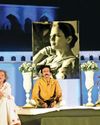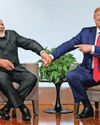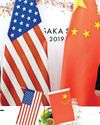Gandhi and Savarkar will continue to remain the two irreconcilable poles of Indian history

October 1906 saw an interesting encounter between two individuals, who were to be political rivals for decades thereafter and whose ideologies were to divide the Indian polity irrevocably. This was when M.K. Gandhi came calling to London’s India House and met Vinayak Damodar Savarkar. Sponsored by a proponent of Indian freedom, Shyamji Krishna Varma, the India House was ostensibly fashioned as a hostel for Indian students studying in London. But under Savarkar’s leadership, it had transformed into a veritable hotbed of “sedition and dangerous revolutionary activities” spanning across Europe.
Savarkar was busy cooking when Gandhi tried to engage with him in a political discussion. Cutting him short, Savarkar asked him to first have a meal with them. Gandhi was horrified to see the Chitpavan Brahmin, Savarkar, cooking prawns. Being a staunch vegetarian, Gandhi refused to partake. Savarkar apparently mocked him: “If you cannot eat with us, how on earth are you going to work with us? Moreover, this is just boiled fish; while we want people who are ready to eat the British alive!” This was obviously not a great first meeting and their differences only increased with time.
The contrasts and similarities between the two men are fascinatingly striking. Both spent significant times outside mainland India—Gandhi in South Africa, Savarkar in London first and then over a decade in the dreaded Cellular Jail of the Andamans. They were both interestingly self-conscious Hindus, though their approach differed. Both advocated Hindi as a lingua franca of a linguistically divided India. Both wrote books in the same year, 1909, that were banned by the British—Gandhi’s Hind Swaraj and Savarkar’s First War of Indian Independence on the 1857 uprising. They were not only political rivals, but intellectual opponents, too.
Denne historien er fra June 30, 2019-utgaven av THE WEEK.
Start din 7-dagers gratis prøveperiode på Magzter GOLD for å få tilgang til tusenvis av utvalgte premiumhistorier og 9000+ magasiner og aviser.
Allerede abonnent ? Logg på
Denne historien er fra June 30, 2019-utgaven av THE WEEK.
Start din 7-dagers gratis prøveperiode på Magzter GOLD for å få tilgang til tusenvis av utvalgte premiumhistorier og 9000+ magasiner og aviser.
Allerede abonnent? Logg på

The female act
The 19th edition of the Qadir Ali Baig Theatre Festival was of the women and by the women

A SHOT OF ARCHER
An excerpt from the prologue of An Eye for an Eye

MASTER OF MAKE-BELIEVE
50 years. after his first book, Jeffrey*Archer refuses to put down his'felt-tip Pilot pen

Smart and sassy Passi
Pop culture works according to its own unpredictable, crazy logic. An unlikely, overnight celebrity has become the talk of India. Everyone, especially on social media, is discussing, dissing, hissing and mimicking just one person—Shalini Passi.

Energy transition and AI are reshaping shipping
PORTS AND ALLIED infrastructure development are at the heart of India's ambitions to become a maritime heavyweight.

MADE FOR EACH OTHER
Trump’s preferred transactional approach to foreign policy meshes well with Modi’s bent towards strategic autonomy

DOOM AND GLOOM
Democrats’ message came across as vague, preachy and hopelessly removed from reality. And voters believed Trump’s depiction of illegal immigrants as a source of their economic woes

WOES TO WOWS
The fundamental reason behind Trump’s success was his ability to convert average Americans’ feelings of grievance into votes for him

POWER HOUSE
Trump International Hotel was the only place outside the White House where Trump ever dined during his four years as president

DON 2.0
Trump returns to presidency stronger than before, but just as unpredictable